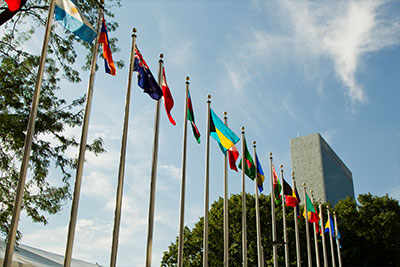
From the ashes of war through seven decades of profound turbulence and change, the vision articulated in the Charter of the United Nations has stood the test of time, even as the world has become transformed beyond anything our founders imagined. That vision — of Member States “uniting their strength” in pursuit of peace, prosperity and dignity for all — continues to underpin our global work.
As we mark the seventieth anniversary of the United Nations, we have much to be proud of. The world has avoided global conflict on the scale seen twice in the first half of the twentieth century. Numerous smaller wars were averted or brought to an earlier end. We have made enormous strides in building the long-term foundations of peace by lifting millions out of extreme poverty, empowering women, advancing human rights, international law and efforts to ensure justice for heinous crimes, and spearheading the decolonization movement.
In spite of all this, however, age-old problems persist, from poverty to discrimination. Inequalities are growing in all societies, and the poorest of the poor are being left farther behind. Shocking crimes of violence against women and girls continue to occur, especially in conflict situations, where sexual violence becomes a tool of war. The newer threat of climate change has only begun to show the potential severity of its impacts. In an increasingly fast-paced and interconnected world, problems have become more complex. Opportunities abound but risks are greater and more contagious. Never before have the most pressing concerns and problems been so common to us all. Never has the need for the United Nations been greater. Never have Member States had more reason to heed the Charter’s call to “unite our strength”.
During the past year, more people were displaced than at any time since the Second World War. Desperate migrants risked everything to flee from hunger, persecution and violence, only to meet with death, discrimination and greater desperation along the way. Conflict and crisis engulfed millions of people in Afghanistan, the Central African Republic, Darfur, the Democratic Republic of the Congo, Gaza, Libya, Iraq, Mali, Somalia, South Sudan, the Syrian Arab Republic, Ukraine and Yemen. Millions faced the brutal tactics of violent extremists such as Boko Haram, Al-Shabaab and Da‘esh/Islamic State in Iraq and the Levant (ISIL), while many foreign fighters found the message of such groups alluring enough to join their cause. Environmental degradation, pollution and resource depletion continued almost unabated around the globe. There was little progress on the long-stalled disarmament agenda. Countless people died of curable diseases, went to bed hungry, buried children who might have been saved with basic health care, and in many other ways suffered avoidable, unacceptable levels of deprivation, fear and hopelessness.
People around the world looked to their Governments and to the United Nations for leadership in preventing and responding to these problems. Looking forward, we have a confluence of opportunities to set the world on a better course. We have the chance to end poverty, bring climate change under control, and agree on shared approaches to funding and implementing a new development agenda.
Already in the past year we made significant progress towards these interconnected ends. Political momentum on climate change was greatly accelerated by the Climate Summit that I hosted in September 2014 in New York and by the twentieth session of the Conference of the Parties to the United Nations Framework Convention on Climate Change in Lima in December. An inspiring set of sustainable development goals has been put forward to guide our work for the next generation, and a comprehensive framework for funding these plans was adopted at the Third International Conference on Financing for Development. The panels on peace operations and peacebuilding produced important reports on how the United Nations can more effectively respond to the security challenges of the future. My Human Rights up Front initiative is designed to enhance our efforts to identify and respond to serious violations of human rights and international human rights law at an earlier stage. I welcome the recent comprehensive agreement between the five plus one group and the Islamic Republic of Iran, which I hope will contribute towards establishing a Middle East zone free of nuclear weapons and all other weapons of mass destruction.
Finally, we have made progress on a number of key transformational initiatives designed to make the Organization truly global and to maximize our capacity to deliver on mandates effectively and efficiently.
Looking forward to the year ahead, I am optimistic that we will soon arrive at a new vision for sustainable development, new directions for the maintenance of peace and security, a renewed embrace of human rights, and a stronger United Nations to help bring our goals to life.
